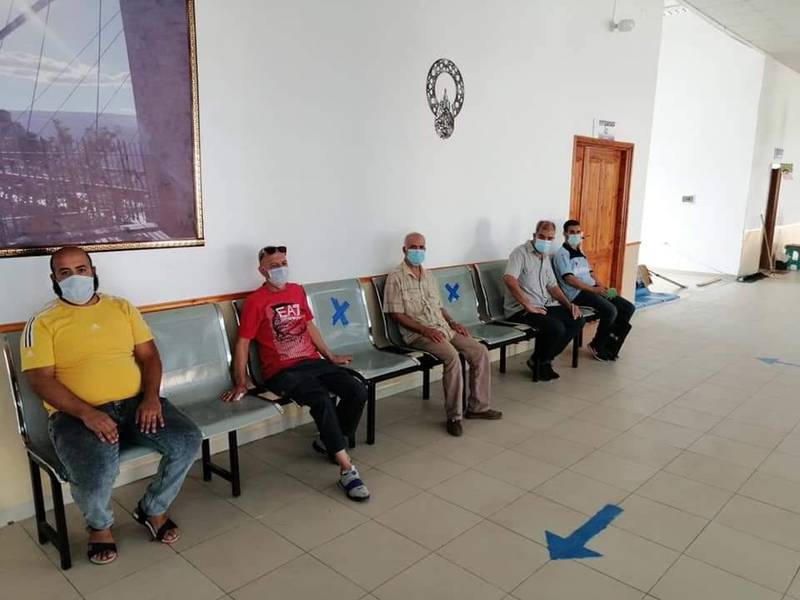Public fears thwart Algeria’s Covid vaccination drive

For Jamila Seyaha, the death of her husband six months ago from Covid-19, although fully immunised, was enough proof that the shot was “futile” and a “scam”. Having seen him struggle for breath for a week before his demise, she is even more adamant about not being immunised despite the latest surge of cases in Algeria and the ready availability of vaccines.
“Since the outbreak of the pandemic, it was my husband’s primary concern to get us all vaccinated in order to keep us safe and to live in peace. It didn’t save him, though,” Ms Sehaya, 40, a nurse who has two children, told The National at a cafe on the outskirts the capital, Algiers.
Health Minister Abderrahmane Benbouzid said this month that only 11 per cent of the 45 million population have been fully inoculated. The immunisation drive was initially limited to adults, but was expanded in October to cover children aged 12 and above. A steady increase in coronavirus cases since December has prompted government measures to curb the spread and encourage citizens to be immunised, with little effect.
The daily infection rate doubled from 192 on December 1 to nearly 400 by the end of the year. On Friday, the Health Ministry reported 1,855 new cases and 15 deaths during the previous 24 hours. The country’s Covid-related death toll since the start of the outbreak has reached 6,468, the official news agency reported.
On December 26, the government introduced a “vaccination pass” for entry to many public venues. On January 4, to raise alarm among unvaccinated citizens, the health minister revealed that more than 90 per cent of Covid patients in intensive care had not been inoculated, with the percentage rising to 100 for those on ventilators.
On Wednesday, President Abdelmadjid Tebboune ordered primary and secondary schools to suspend classes for 10 days from January 20 to reduce infections.
Widespread fears
To many Algerians, including 20-year-old Younis Osmani, such measures are not enough to overcome widespread public fear of the vaccines’ side effects.
“Enforcing the vaccination on people amidst limited awareness campaigns is not the right approach,” the law student said.
He criticised the government’s spending of millions of dollars on vaccines at a time when a financial crisis has left many people unable to buy essential foods.
“Algerian people’s priority is to feed their families and not stand in line to take a vaccine they don’t know the side effects of,” he said.
The government has purchased millions of vaccine doses since they became available, in addition to producing the China-developed Sinovac vaccine locally to cut import costs. But in late December, with the uptake low, Mr Benbouzid said the country’s stockpile of 13 million doses was at risk of expiring before it could be used.
According to journalist and writer Ali Boukhlaf, the circulation on social media of articles with unverified claims about side effects has hyped up vaccine fears.
“Ideological reasons, or fear, but mostly lack of sufficient information to satisfy a person’s curiosity, fuels more of this fabrication of stories,” he said.
Mohamed Molhaq, a researcher in virology, blamed Algeria’s low immunisation rate on “the absence of a public scientific dialogue that tackles certain concerns to persuade the Algerian citizen to to take the vaccine”, such as addressing “the fact that side effects can happen, but are rare and are much weaker than symptoms resulting from contracting the virus”.
Predicting “difficult times ahead” for Algeria, especially with the record daily infections with the Omicron variant, he called for greater nationwide awareness and respect for precautionary measures.
Vast differences
Across Algeria, glaring discrepancies are visible between diligent followers of Covid-19 precautions and those who take the risks lightly. Handshakes, hugs and kisses are common as many dismiss social distancing guidelines.
Such an attitude alarms people such as Khalid Mahiobi, a man in his seventies who was queueing outside a vaccination centre in the capital on Wednesday wearing two face masks and gloves.
“I participated in the Algerian liberation revolution against the coloniser and carried the bodies of my martyred friends, but I did not feel as much fear then as I do today. My fear is not of death, but of the fact that I do not know who I am fighting,” he said.
“I am here to protect myself and those around me, and to not be a reason for transmitting the virus to them,” he said. “Although I am not sure of the effectiveness of the vaccine, this does not prevent me from taking it and trying to save the lives of those I care for.”
